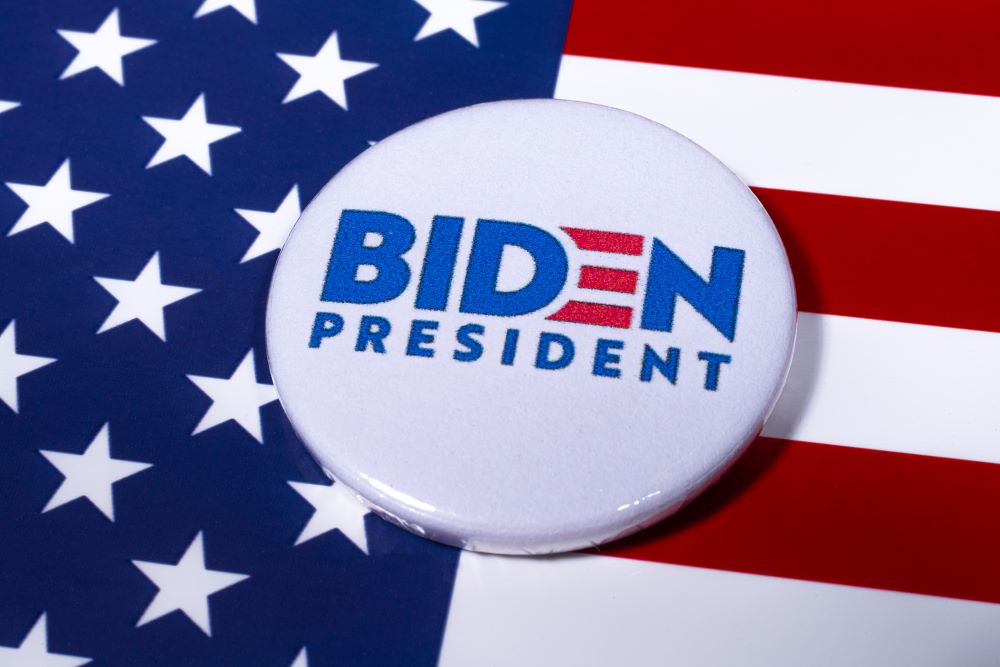
As the US inaugurates a new President in Washington DC today, how is Joe Biden's approach to international trade likely to differ from that of his predecessor?
The IOE&IT Daily Update today (20 January) summarises Biden's recent comments about US trade policy as well as the prospects of a UK-US trade deal.
1. It’s still 'America First'
Despite hopes that Biden will offer a new start following Donald Trump’s ‘America first’ approach, there may be more similarity than expected.
Biden has said that there will be no new trade policies until he has looked at domestic issues to boost US competitiveness, particularly as the country looks to recover from the impact of the Covid-19 pandemic.
This includes investing trillions of dollars into energy, education, and infrastructure. He is looking to implement federal ‘Buy American’ policies to favour domestic producers, while also strengthening workers’ bargaining power, according to the Council on Foreign Relations.
“I’m not going to enter any new trade agreement with anybody until we have made major investments here at home and in our workers and in education,” the Guardian reported him saying in December.
2. Biden hasn’t said much about the UK
When the UK government threatened to ‘override’ elements of the Northern Ireland Protocol in September, Biden warned that the Good Friday Agreement must not become a “casualty of Brexit” and that a UK-US trade deal was dependent on this.
Biden tweeted that “any trade deal between the US and UK must be contingent upon respect for the Agreement and preventing the return of a hard border. Period.”
Although a UK-EU trade deal has since been agreed with the NI Protocol implemented, Biden hasn’t given any indication that a trade deal with the UK would be a US priority.
UK trade officials were initially flatfooted by Biden’s win, having pinned their hopes on continuing Boris Johnson’s relationship with Trump to secure a UK-US deal.
Former US ambassador Kim Darroch has said the UK would be “lucky” to strike a trade deal with the US over the next four years, reports the Independent.
Darroch believes Biden is more likely to focus on securing deals with the EU than with the UK.
According to 2018 figures, the US was the UK’s largest single-country trading partner. Trade with the US amounted to £201.6billion or 15% of the UK’s total.
3. EU tariffs to ease
The BBC reports that Biden will look to improve EU-US relations by halting the escalation of tit-for-tat tariffs exchanged in the ongoing dispute over aviation subsidies.
The US has delayed 25% duties on French luxury goods ahead of Biden’s inauguration, according to the FT. The tariffs were initially introduced by President Trump in response to a French digital tax which mainly affected US digital businesses.
The threat of car tariffs is also likely to recede, the BBC predicts.
4. Return to global stage
Trump withdrew the US from the Obama administration’s Asia-Pacific trade deal – the Trans-Pacific Partnership (TPP) – and halted talks on a US-EU trade deal as well.
He also hampered the World Trade Organization’s (WTO) by blocking appointments to its dispute resolution body and threatening a US withdrawal from the body entirely.
Joe Biden is looking to take a more multilateral approach, vowing to work with other democracies to rewrite the rules of international trade, the BBC reported in November.
“We make up 25% of the world’s trading capacity, of the economy of the world. We need to be aligned with the other democracies - another 25% or more - so that we can set the rules of the road,” he said.
Biden is a long-time a supporter of trade liberalisation, championing TPP as vice-President to Barack Obama. As a senator he voted for the North American Free Trade Agreement (NAFTA) as well as China’s entry into the WTO.
5. Bulwark against China
Trump waged angry trade wars against China, but Biden has his own strategy towards the economy that may soon become the biggest in the world.
Biden told the New York Times in December that he wants to consult with traditional US allies in Asia and Europe “so we can develop a coherent strategy” before making a move on tariffs.
“The best China strategy, I think, is one which gets every one of our — or at least what used to be our — allies on the same page,” he said. “It’s going to be a major priority for me in the opening weeks of my presidency to try to get us back on the same page with our allies.”
In the meantime, he said he won’t “make any immediate moves, and the same applies to the tariffs”.

